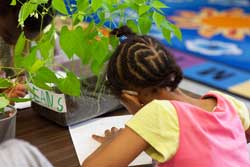Our “Learning Expeditions” allow us to learn about our world
while sharpening our reading, writing, and critical thinking skills.
Although the district’s science and social studies standards for Grade 4
are always addressed, specific Learning Expeditions vary from year to
year in response to current events and/or students’ needs and interests.
Examples are described below.
The Changing Charles
 We
explore the history of the Charles River. We learn about the challenges
the river faces due to natural weathering and erosion as well as the
impact of pollution caused by human beings. We hone our persuasive
writing skills by appealing to the public to protect the Charles. We
also create calendars to raise money for local environmental
organizations working to conserve the Charles.
We
explore the history of the Charles River. We learn about the challenges
the river faces due to natural weathering and erosion as well as the
impact of pollution caused by human beings. We hone our persuasive
writing skills by appealing to the public to protect the Charles. We
also create calendars to raise money for local environmental
organizations working to conserve the Charles.
The Ancient Maya
We
immerse ourselves in the culture of the Ancient Maya. We learn how to
respectfully study cultures with different values and traditions. We
learn about how anthropologists use artifacts, fossils, written records,
and oral histories to piece together the story of ancient cultures. We
research specific facets of the Mayan Civilization and visit the Peabody
Museum to learn from experts in the field.
Circuits and Pathways
Students
engage in hands-on exploration of electrical circuits. We consider the
role of electricity in our daily lives, and examine ways to conserve
electrical energy. We also examine the role electricity might play in a
greener future, for example, the move towards “green fleets” of electric
vehicles.
The American Dream
Students
explore the regions of the United States the lens of particular
ethnic/cultural groups who had a significant impact on the evolution of
each region:
- The Navajo of the Southwest
- African-Americans in the Southeast
- Chinese immigrants in the West
- European pioneers in the Midwest
- Jewish immigrants in the Northeast
We start by looking at the time when those cultural groups first came
to the U.S. in order to understand their present day contributions to
the United States Mosaic. As we think critically about our collective
history, we ask ourselves: “What does our generation need to do to fully
realize the American Dream for all Americans?”